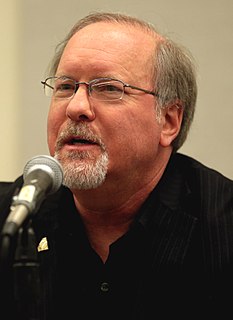A Quote by Kevin J. Anderson
Sure, President Bush can say that the U.S. government won't fund stem cell research, but believe me, Japan is applauding. Because they will just do it first and get all the patents.
Related Quotes
Who knew, in 2000, that compassionate conservatism meant bigger government, unrestricted government spending, government intrusion in personal matters, government ineptitude, and cronyism in disaster relief? Who knew, in 2000, that the only bill the president would veto, six years later, would be one on funding stem-cell research? A more accurate term for Mr. Bush's political philosophy might be incontinent conservatism.
In science there is something known as a stem cell. A stem cell is an undifferentiated cell which has not yet decided whether it's gonna be a cell of your brain or a cell of your heart or of your finger nail. But science is learning how to coax, how to manipulate, the raw material of life that we call stem cell to become any cell of the body. I think that God is the stem cell of the universe.






































